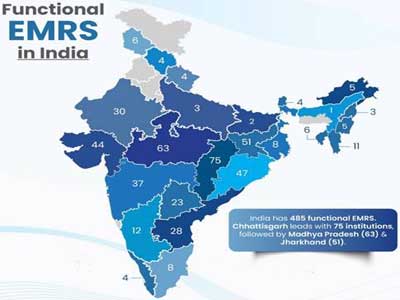Emerging from remote tribal villages across India, 597 students from Eklavya Model Residential Schools cleared the highly competitive JEE Main, JEE Advanced, and NEET exams in 2024-25, a remarkable surge from just two students in 2022-23. This achievement demonstrates how targeted educational support is transforming lives and providing opportunities to Scheduled Tribe students in India's most underserved communities.
Among the 230 EMRS schools offering Class 12, 101 have students who successfully cleared these prestigious examinations. One shining example is Jatin Negi from Sangla village in Himachal Pradesh’s Baspa Valley. Despite growing up in a remote Himalayan village that faces harsh winters and frequent power outages, he cleared JEE Advanced with an All-India Rank of 421 and is now studying B.Tech at IIT Jodhpur.
Read in Hindi: आदिवासी बच्चों के शैक्षणिक विकास की नींव रख रहे हैं एकलव्य स्कूल
Jatin Negi is one of the many students who have benefited from this educational support. He joined EMRS Nichar in 2017 when he was in Class 6. Living in a remote area with limited connectivity, Negi’s schooling was frequently disrupted during the harsh winters, when heavy snowfall isolated his community from the outside world.
“We would have no electricity for two months at a stretch and would have to use solar lamps at night to study. The only connection we had to the outside world was a public microphone at the bus station,” Negi said.
At the EMRS hostel, he received guidance from his teachers and settled into a structured school routine. "Gradually, I began to understand how the wider world worked," he said.
Negi developed an interest in academics at the EMRS, and his teachers prepared him and other students for competitive exams. "Instead of just preparing us for board exams in the traditional way, they adopted a competitive approach. Tests became regular. We were given detailed feedback with grades and marks. They consistently pushed us to improve, and this regular, disciplined approach transformed our learning experience," Negi adds.
Negi's father passed away when he was in Class 12 in 2024, causing him great distress. He struggled to perform well. His EMRS teachers helped him navigate this difficult period, and Negi took a year off to prepare for the 2025 exam, which he cleared. "Despite the difficult conditions at home, I stayed focused on my preparation. I would wake up at 6:00 AM, have breakfast, study the entire day, and go to sleep at 2:00 AM. That was my daily routine. Whenever I had doubts, I would ask my teacher," he concludes.
When Negi cleared the tough engineering exam and secured an All-India Rank of 421, his family and community were overjoyed, even though many had not heard of an IIT before. He hopes that his achievement inspires people from all communities to pursue their dreams.
Padvi Urjasviben Amrutbhai from Khapatia, Gujarat, who studied at EMRS Bartad and cleared the NEET exam, is also a stellar example of the power of education and hard work for empowerment and fulfilling one’s dreams. She is set to achieve her dream of becoming a doctor and is now pursuing MBBS at the GMERS Medical College and Hospital in Junagadh.
Padvi also believes in the power of hard work. Hailing from a small village, she is one of two sisters. “Villagers used to say to my parents, ‘You don't have a son, what can girls do?’”
Amrutbhai struggled to study in a non-Gujarati medium and lacked confidence in class. Fortunately, she received help from an EMRS teacher who motivated her and encouraged her.
When Amrutbhai achieved a rank of 11,926 in the NEET exam, it reinforced her belief in the transformative power of education and hard work. She believes education can help people overcome social barriers and discrimination. "I want to tell the villagers that girls can fulfil their dreams. I want to make my parents' name shine," she said.
Their stories capture the life-changing opportunities created by Eklavya Model Residential Schools. Established by the Ministry of Tribal Affairs, Eklavya Model Residential Schools impart quality education to Scheduled Tribe students, enabling them to access opportunities in higher and professional education and secure employment in various sectors.
There are 485 functional EMRS schools in the country with 1,38,336 students enrolled in 2024-25. Overall, a total of 722 schools are sanctioned, and Rs.68,418 lakhs have been released for the schools.
The grants provided by the Ministry of Tribal Affairs to the state governments are meant for the construction of schools and for meeting their recurring expenses. The provision guarantees grants-in-aid from the Consolidated Fund of India each year for promoting the welfare of the Scheduled Tribes.
The EMRS scheme was launched in 1997–98. In the Union Budget 2018–19, the Government of India announced that Eklavya Model Residential Schools would be established in every block with more than 50 per cent Scheduled Tribe population and at least 20,000 tribal persons.
The expansion of EMRSs directly benefits local tribal communities by providing free, high-quality, CBSE-affiliated education to children within or near their own environment. With well-equipped hostels, classrooms, laboratories, and sports facilities, EMRSs ensure holistic development, including academic, physical, and extracurricular growth of tribal students.
In addition, students receive free boarding, nutritious meals, healthcare, and career guidance, contributing to their overall well-being and readiness for higher education and competitive careers. Collectively, these measures enhance educational attainment, promote social inclusion, and empower tribal communities economically and socially.














Related Items
Indian schools lost plot and coaching became only gateway to success…
New labour codes modernising India’s MSME ecosystem
Powering AVGC-XR revolution, India’s leap into the future of entertainment